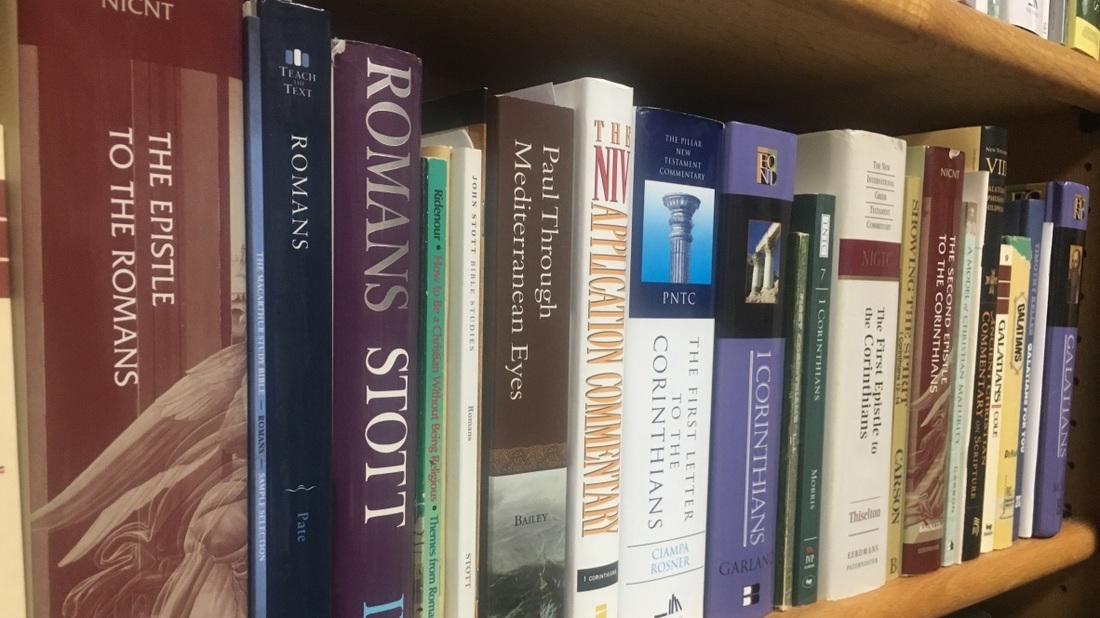|
Earlier this week, I ran across this short video where R. Kent Hughes talks briefly about why pastors need commentaries. I encourage you to check it out if you're interested. (By the way: Hughes is always worth listening to, in my opinion. His pastoral wisdom is great, his love of the Bible is great, and he communicates well. Oh yeah, and his book Disciplines of a Godly Man is still one of my first "go to" books for dudes.) So again: The video is worth watching. But it got me thinking beyond just why PASTORS need commentaries. (I agree with him on that, just so we're clear.) As a pastor and a teacher myself, I also want others who aren't in full-time vocational ministry to know that commentaries can be accessible (at least some of them!), and that commentaries can offer benefit to their own personal study and life of devotion. One more brief comment that may be helpful. If you're brand new to this word "commentary," here's the scoop: A commentary is basically a book written about a book of the Bible - it's a book that offers commentary on the message and meaning of either a book of the Bible or a few books of the Bible grouped together - often along with other important introductory material on the biblical book, like historical and cultural context, who wrote it and why, etc.. (In some cases, a Bible commentary is a single volume on the entire Old or New Testament, or even on the entire Bible itself.) Here are three reasons ANYONE may want to read a commentary - even if you're not a pastor: As you read the Bible closely, you'll probably have questions the pastor won't answer. Commentaries can help.The more I teach and preach, the more I realize how much good content I'm NOT going to be able to get to - either because EVERYTHING can't fit into the time allotted, or because of the focus and particular objectives of the teaching time. In other words, there are usually questions people have - good questions, by the way! - that I'm not going to address as I teach. For people who want to dig into some of these deeper questions (historical or cultural context, various interpretations of a particular passage, etc.), commentaries can be a great help. As you read the Bible closely, you won't always know what questions to ask. Commentaries can help.So much of learning is knowing the right questions to ask. (And then we spend a lifetime digging into those questions!) But what happens when we read a passage from the Bible that we want to be learning from, but we're overwhelmed by weird language the Bible uses, foreign references, or the fact of historical and cultural distance separating us from the original audience? This is where commentaries can help us learn what the right questions to ask of a passage are - even if this sometimes happens indirectly. By seeing how commentaries approach the Bible in such a way as to get at the Bible's meaning, we can learn how to approach the Bible in such a way as to get at the Bible's meaning. It's usually a good idea to consult the experts and stand on their shoulders when possible.I say it's usually a good idea to consult the experts, because there are a few disclaimers I want to make sure and get in our minds here. Consulting the experts doesn't mean it's the first place we start - it's always best to start with reading and studying the Bible ourselves - personally and in small groups. That way we have a handle on what the passage is saying, and where we have questions. Also, consulting the experts doesn't mean they're always right. There are some really smart people out there, who are really wrong in their interpretations or applications of the biblical text. This is why it's good to read widely, and to have a conviction that the Bible is always our ultimate authority - not some commentator. I've heard it said more than once (and I agree with this): Bible commentaries can make good servants, but are poor masters. Commentaries should serve our study - not control it. With all the necessary disclaimers out of the way, however, we still come back to this important point: Commentaries can be helpful. They help us learn from experts who have been studying the Bible a lot - often as a major part of their academic or pastoral careers. And we should want to stand on their shoulders - to benefit from their study and understanding and teaching, so that we can apply the message of the Bible ourselves and live transformed lives that come from "renewing of our minds" by rightly understanding biblical truth (Romans 12:2). Did you find this post helpful? You may also be interested in these:
1 Comment
|
Tim WiebeChristian. Husband. Father. Pastor. Learner. Contributor. Reader. Categories
All
Archives
June 2024
|
© 2014-2024 | 11607 M Circle, Omaha NE, 68137 | www.thebrooksideinstitute.net


 RSS Feed
RSS Feed
